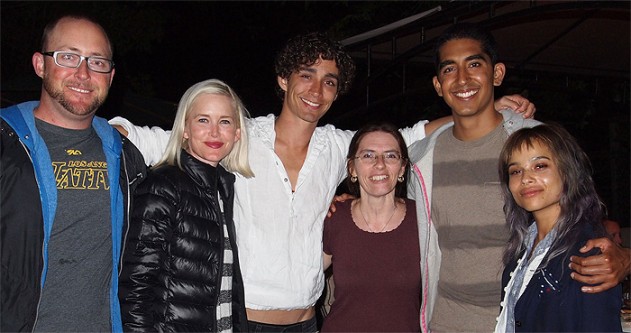TALKING MOVIES | THE ROAD WITHIN, gentle comedy about affliction
On Friday Gren Wells‘s “The Road Within,” a low-key dramedy about affliction adapted from the 2010 German film “Vincent Goes to Sea,” opened in New York and Los Angeles. It stars the young, promising Irish actor Robert Sheehan as a teenager stricken with Tourette’s, whose cold-hearted father (Robert Patrick of “Terminator 2″: Judgment Day”) installs him in a mental clinic after his mother dies. Once there, he strikes up a fraught but well-meaning friendship with his germophobe roommate (Dev Patel) and a tentative romance with the anorexic Marie (Zoë Kravitz), and then the three set off on a road trip to both escape the ward and spread Sheehan’s mother’s ashes. Screen Comment spoke with Wells (who co-wrote the 2012 Kate Hudson cancer comedy “A Little Bit of Heaven” and debuts as director here), Sheehan and Patrick about making the film.
The film is about affliction yet some of the material is played, gently, for laughs. Did you worry about offending people?
Gren Wells: Well, I would say that I don’t think we played it for laughs. In a true dramedy, you can go deep, you can go dark with a character and then twist it and it’s ten times as funny because the audience is in love with that character. The characters laugh at each other and laugh at themselves. And then because we recognize certain character traits in these people that resonate with us, that’s when we feel that it’s OK to laugh. We’re basically laughing at ourselves.
We wanted to do authentic portrayals, as opposed to some of the depictions in the past where people with Tourette’s have been the butt of jokes. We had a young man named Jackson Kramer on board [the son of “Chicago Hope” producer Jeffrey Kramer, both of whom also have Tourette’s]. If Robbie [Sheehan] ever went too big, Jackson was there to monitor that.
What was the most difficult part of preparing for the role?
Robert Sheehan: Gaining a sense of confidence. That took longer than I thought. You never know if that confidence is going to come. We worked at it and worked at it and I was motivated by a sense of terror, that I might be misrepresenting the direction of the film. By the time we filmed, [the character] was truly, deeply under my skin.
Gren Wells: So much so that after we stopped filming he was still ticking, and I really thought I messed him up for the rest of his career!
RS: Jackson actually redeveloped some of the tics he’d had in his adolescence, because he was working on the movie.
GW: Flipping people off, that was one of Jackson’s tics that we ended up putting in the film, because that also worked very well for Robbie. When they trained together, Robbie mirrored all of Jackson’s tics and then after a few days, once he got really good at that, Jackson and I said to him, “Now you gotta throw all that out and create your own!” Because no two [people with] Tourette’s are ever the same. Robbie had to find the tics that worked for his body, because he was gonna have to repeat them again and again and again.
What was the longest number of takes you had in each scene?
GW: We actually had a three-take maximum for every scene, because we shot it in 23 days. We didn’t have a lot of time. The rehearsal came in really handy because Robbie nailed it on the first take in every scene.
RS: That’s what they call me the One-Take Kid.
Robert, what attracted you to the script to begin with?
Robert Patrick: Is that for me? There are two Roberts here. There’s a Robert Sheehan, he’s got an Irish accent, and there’s a Robert Patrick who’s got a goddamn American accent.
The fact is, the guy is ill-equipped to deal with his son and the issues he has. He has his own agenda and the son is an inconvenience. I saw that there was a nice turn where all of a sudden the realization comes, that he was embarrassed by his son, and that all he really wanted was another son. It’s a difficult thing to articulate, because he does [deep down] love his son.
What was the most difficult scene to shoot?
RP: I think yelling at Robert when his mom dies, when I’m packing up that room, was a difficult thing. It seems so heartless, because I’m not that way. In real life, I’m actually a sweet guy. To take it out on the boy, it just didn’t seem like I had a lot of compassion for my son.
RS: The scene I found very challenging is when Marie is in bed at the end and I’m by her side and she regains consciousness. She’s sort of desperate to get out of the hospital and desperate for me to free her. And she’s at death’s door, and the challenge in the scene was to go against my instincts in a way and be sort of unemotional and matter-of-fact, and quash the emotion I was getting from her. It’s that moment of pure tough love, where you have to just say, “I’m not gonna be a crutch for you,” and say it without breaking down.
What inspired the story?
GW: It’s based on a German film I found and adapted and optioned. What really resonated with me is that growing up, I was anorexic and bulimic, so that whole storyline I knew intimately. But also, when I was 15, a horse stepped on my face, and trust me when I say that no one wants to be friends with the girl with a hoof print on her face. So I have always related to outsiders. Literally everyone is an outsider, and that’s why “The Breakfast Club” is such a classic film. Whether you’re a jock or a dork, it doesn’t matter; everyone feels like an outsider, and that’s what makes it so universal. You don’t have to have anorexia, OCD or Tourette’s to relate to these characters.
Where did you shoot the film?
GW: We cheated by shooting the majority of the film in L.A., to [fill in for] Reno. The last few days we went up to Yosemite, Big Sur, Santa Cruz and Groveland, because it’s a road trip movie and you have to actually go somewhere. It would not have been the same if they went to the top of Griffith Park and looked down on the smoggy L.A. skyline and said, “Wow, we’ve arrived!”
Yosemite is one of the most beautiful places on Earth. In the film, it doesn’t even look real. It didn’t even look real in person. There were rocks 1,000 feet high. It just blows your mind. People asked if those were backdrops and backdrops would have cost the entire budget of the film! It was cheaper to go to Yosemite. They have a lot of rules for shooting there, though. Only 20 people, including cast and crew, can be in the park at any given time. So our costumer was left back at the hotel. It was very challenging but totally worth it when you see how beautifully it photographed.
Were there any scenes you had to cut that were painful to cut?
GW: Yeah. There’s this beautiful scene in the clinic where Vincent opens up for the first time and is vulnerable, explaining the fact that he has Tourette’s and some of the painful experiences in his past. The scene existed for the audience to see that side of Vincent, and it’s when Marie first falls in love with him. But because I had such an extraordinary actor, from moment one, you already love the character, even though he’s doing things that could turn an audience off. So I didn’t need the scene anymore. It felt repetitive. But it is on the DVD.
Is the movie out on DVD soon?
GW: Yes, but we’re telling people to see it in theaters in New York and L.A., because it is a theater-going experience. It’s one of those unique challenges where for the first few minutes people aren’t sure whether or not to laugh. They feel awkward. I like challenging the audience. Hopefully it will reach a wider audience and start a dialogue about not only mental health issues but also compassion and understanding for those suffering.
You definitely have him say some risqué things, like when he shouts the racial epithets at Dev Patel.
GW: That’s the nature of Tourette’s. It’s the most inappropriate thing at the most inappropriate time.
What’s the most surprising festival reaction you got so far?
GW: We are Rated R in the US for language and brief nudity, and overseas the rating is 14 to 18 years old, because they don’t believe it will corrupt someone, if they hear a four-letter word or see a pair of boobs. They really understood what we were trying to do and they were so mature about the subject matter. On the flip side, I went to the Napa Film Festival, and it was definitely an older crowd and I wasn’t sure how they’d react to the language. This 80 year-old woman came up to me crying and hugging me and saying this movie will change people’s lives. She had a daughter who had a disability and it was the first time she’d seen it portrayed accurately on film and she wanted to thank me.
RS: I have had some really pleasant, lovely feedback from people. I’ve been bowled over and delighted by how lovely all the feedback has been. Thankfully, that’s been pretty much across the board.
GW: We have really had a 99.9% success ratio in screening the film, because everyone understands what we’re trying to do. One guy didn’t like the fact that the characters were smoking. Someone’s gonna find a problem with it because they want to find a problem. But luckily that’s literally one person.
news via inbox
Nulla turp dis cursus. Integer liberos euismod pretium faucibua




